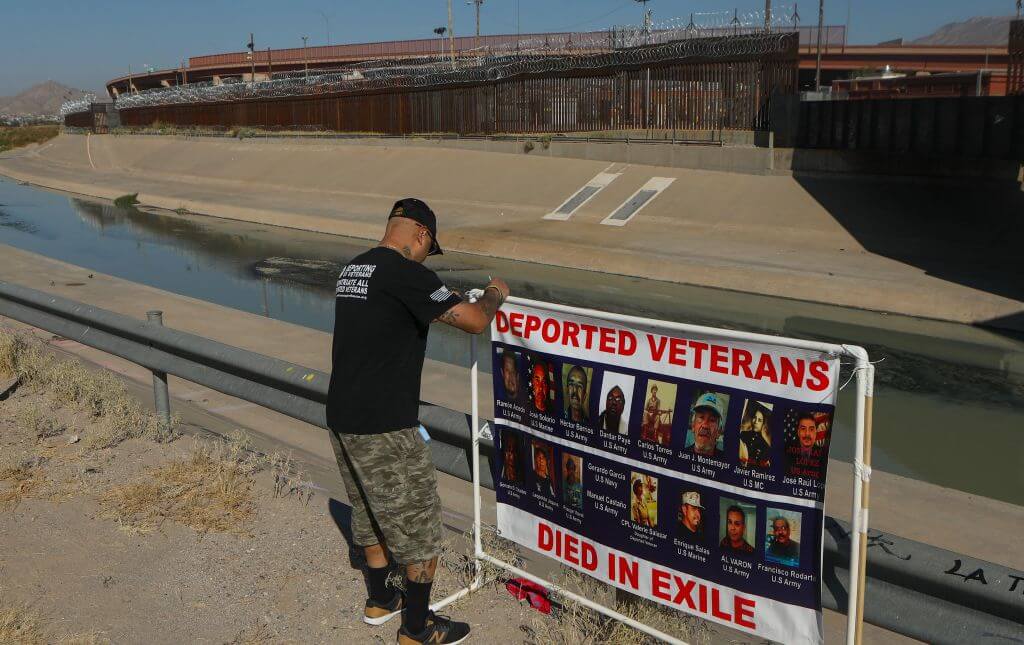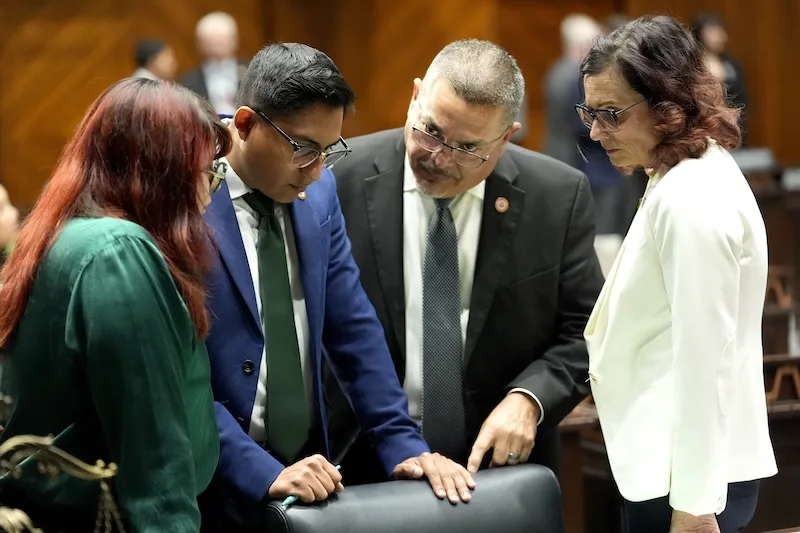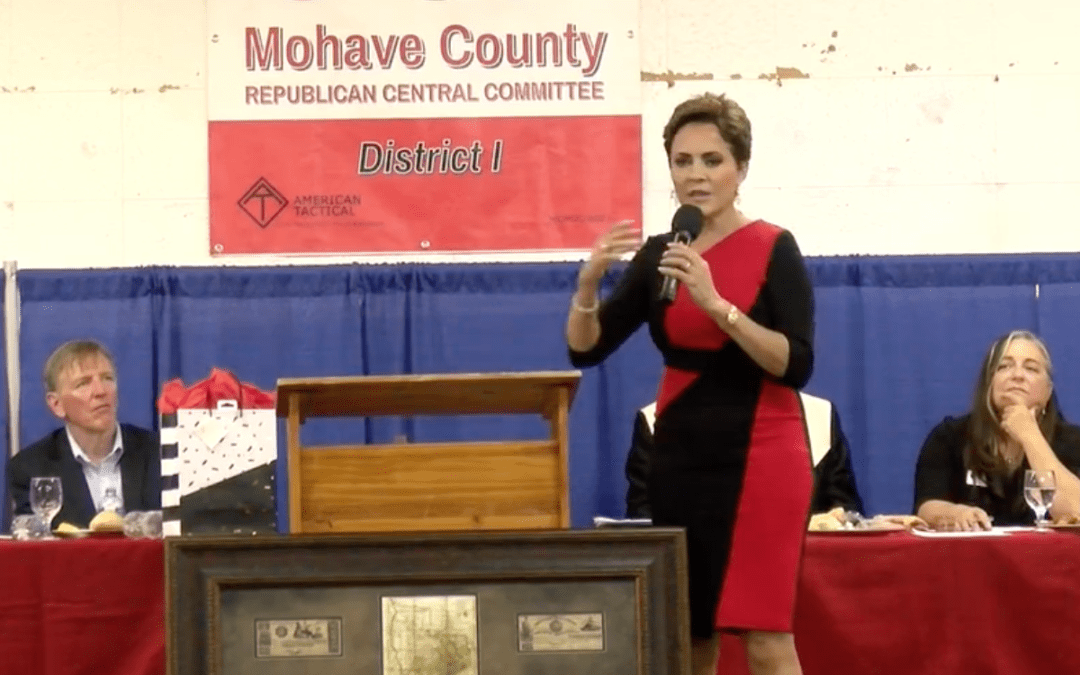
(Photo by HERIKA MARTINEZ / AFP) (Photo by HERIKA MARTINEZ/AFP via Getty Images)
The Biden Administration has committed to reuniting deported veterans with their families and helping immigrant service members obtain US citizenship.
Last month, the Department of Veterans Affairs began contacting 123,983 non-citizen US military veterans about securing their citizenship as soon as possible to avoid deportation. According to NBC News, this figure includes veterans who were not citizens when they left the military between 2001 and 2022.
RELATED: Supreme Court Rules Against Biden’s Deportation Policies. Here’s Why That’s Dangerous.
The initiative to help non-citizen US military veterans began last summer when President Joe Biden said his administration would help “hundreds, possibly thousands, of deported veterans and their immediate family members back to the United States, saying their removal ‘failed to live up to our highest values.'”
The exact number of non-citizen US military veterans is unknown because many were deported to their native countries after their service. The National Immigration Forum estimates that an estimated 40,000 immigrants served in the US armed forces in 2015—a number that has steadily decreased every year—and about 5,000 non-citizens enlist in the military each year. Meanwhile, approximately 94,000 immigrant veterans do not have US citizenship.
According to the United States Citizenship and Immigration Services (USCIS), the top five countries of birth among those naturalized include the Philippines, Mexico, Jamaica, China, and South Korea.

Support for Deported Veterans
Since 2012, Hector Barjas, the director and founder of Deported Veterans Support House based in Tijuana, Mexico, has been helping veterans that were deported to Mexico. His database includes at least 500 non-citizen US military veterans, including some Arizona residents.
In an interview with Copper Courier, Barjas said that he has been contacted by the Department of Veterans Affairs about their aim to naturalize deported veterans.
RELATED: Supreme Court Says ‘Remain in Mexico’ Policy for Asylum Seekers Can End
“I’ve been working with Saif Khan [special assistant in the Office of General Counsel for the Department of Veterans Affairs] and Debbie Rogers [Director of the Immigrant Military Members and Veterans Initiative], and of course the ACLU, for many years,” Barajas said. “But yeah, we recently heard about the efforts they’re trying to do outreach urging people to become citizens.”
Not a Guaranteed Path to Citizenship
There are several reasons veterans never become US citizens, despite the promise of citizenship by the US government. First, some service members believe they automatically become US citizens when they sign up to be active military members, but that is not the case. There’s a lot of paperwork involved, and some neglect to begin the process.
Margaret Stock, a former Army lieutenant colonel and an immigration lawyer, told NPR that naturalization used to be part of basic training for immigrants serving the United States, but those laws changed under the Obama administration. “As a result, lots of green card holders went to Iraq and Afghanistan without becoming citizens,” NPR reported. If immigrants who are serving commit crimes, it factors into their deportation.
Furthermore, the Bureau of Justice Statistics reports approximately 107,400 veterans are in state or federal prisons. When they’re finally released, these veterans are at increased risk of homelessness, suicide, death by drug overdose, and deportation. That’s why it’s vital to re-connect veterans to VA care and benefits to which they may be entitled post-incarceration.

Steps to Citizenship for Veterans
Barajas said his organization is in place to help close that gap and help deported veterans return to the US.
“We want to solve a problem,” Barajas said. “Basically, if somebody gets in trouble, or let’s say they don’t renew their green card, they can face deportation. So it’s not guaranteed that you won’t be deported right now. So the best thing these veterans can do is become citizens because they’re entitled to their benefits.”
RELATED: Child Tax Credit to Military Pensions: What to Know About Filing Your Taxes This Year
According to the Department of Veterans, all eligible veterans are entitled to VA benefits regardless of their immigrant status. The same applies to those who live abroad.
For more information, people can call the Military Help Line at 877-CIS-4MIL (877-247-4645), a toll-free number exclusively for current military members, their families, and veterans.
The helpline is available to assist with immigration-related information, such as:
- Checking the status of your Form N-400, Application for Naturalization;
- Notifying us of a new mailing address or duty station;
- Obtaining posthumous citizenship for a deceased member of the US armed forces; and
- Submitting an application for expedited processing of military N-400 and N-600 applications.
If you are a service member or an eligible family member stationed in the US or outside of the country, you may also access the helpline using the toll-free number through their base telephone operator or using the Defense Switched Network (DSN).
Looking for the latest Arizona news? Sign up for our FREE daily newsletter.
Politics

Democrats clear path to bring proposed repeal of Arizona’s near-total abortion ban to a vote
Democrats in the Arizona Senate cleared a path to bring a proposed repeal of the state's near-total ban on abortions to a vote after the state's...

It’s official: Your boss has to give you time off to recover from childbirth or get an abortion
Originally published by The 19th In what could be a groundbreaking shift in American workplaces, most employees across the country will now have...
Local News

Kari Lake calls on Arizona county sheriffs to enforce 1864 abortion ban
Republican candidate for US Senate Kari Lake on Saturday seemed to solidify her support for Arizona’s total abortion ban and called on county...

Where to buy farm-fresh eggs in Tucson
Once you’ve tasted farm-fresh eggs, it’s hard to go back to the store-bought variety. Not only do farm-fresh eggs taste better and have...





